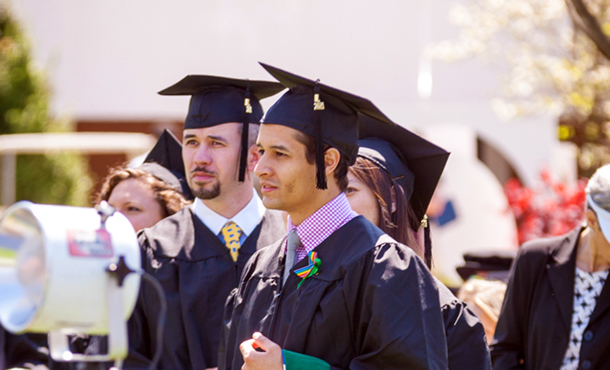After double-majoring in pharmacology and toxicology as well as biological sciences at the University of Buffalo in New York, Ghassan “Gus” Mohsin began looking for a graduate program that would further prepare him for medical school. Browsing the listings on the Association for American Medical Colleges website, he stumbled across Eastern Mennonite University’s brand-new MA in biomedicine program that appealed in several ways.
Similar costs of living in Harrisonburg, Virginia, and Buffalo, New York? Nice. Major big-city-to-small-town change of pace? Good. Two-year program culminating in a master’s degree? Handy to have that extra credential in case med school doesn’t happen.
Mohsin also liked that the university and program advertised their Christian foundations, even though he himself was a Muslim. (Born in Yemen, Mohsin moved with his family to the United States as a young child.) During his two years studying at EMU, he felt encouraged to explore the relationship between his own faith and medicine, and found himself connecting more strongly with his own religious background.
As one of the first eight to undertake the MA in biomedicine program – he completed his final course project in early fall 2014 – Mohsin appreciated the program’s strong focus on treating whole people, not isolated pathologies.
“It’s broadened my horizons. [Medicine] is not just about drugs and hospitals,” says Mohsin.
Regular bioethics seminars that examined controversial medical topics such as euthanasia and abortion from different standpoints were another highlight of Mohsin’s experience.
Mohsin is applying to medical schools in the hope of one day being a pediatric neurologist – an interest he traces to his love of “the mystery of the brain” and his younger sister, who suffered from seizures as a child.
Mohsin hopes to teach at a community college until he is admitted to medical school. He got the chance to practice that skill as a graduate assistant for EMU’s unique anatomy and physiology course, in which students – even at the undergraduate level – dissect a human cadaver. After taking the course himself, and then helping to teach it twice, Mohsin says he developed a very good grasp of human anatomy that will give him “such an advantage over so many aspiring medical students.”
Mohsin says he feels well prepared to handle the workload and material he’ll encounter in medical school. And in a broader sense, the whole-patient perspective of health emphasized by EMU’s program has equipped him to heal people instead of just treating illness – something, he says, that our current healthcare system needs plenty more of.
